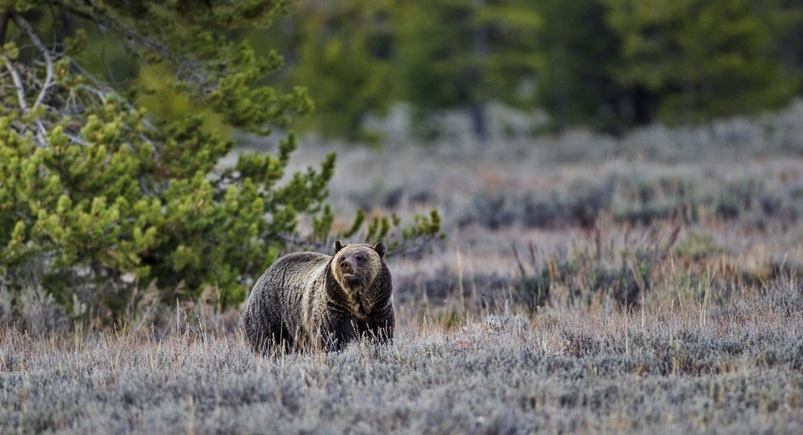In 2019, the Fish and Wildlife Service (FWS) awarded $2,000 to a whistleblower who exposed the true killer of a Wyoming grizzly bear. While another man was indicted for the killing, the whistleblower voluntarily came forward and identified the actual culprit. The existence of this whistleblower award was not previously made public and was made available to Whistleblower Network News in response to a Freedom of Information Act (FOIA) request.
In September 2015, a grizzly bear was found dead near Barber’s Point in the Shoshone National Forest northeast of Dubois, Wyoming. A Wyoming Game and Fish Department (WGFD) Game Warden and a FWS Special Agent investigated the scene and determined that the adult female bear was shot dead while feeding on an elk carcass.
“This grizzly bear was just doing what a bear does and had posed no danger to humans nor had any history of negative interactions with humans,” wrote the WGFD. Grizzly bears are protected under the Endangered Species Act (ESA) and it is thus illegal to kill one.
Over the next couple of years, WGFD and FWS conducted an investigation and obtained an indictment against an individual they believed killed the bear. But then in 2018, the whistleblower called WGFD and reported that while the indicted man was present for the killing another man was the actual culprit.
The whistleblower reported that the actual killer had told her how he and the indicted man planned to beat the charges because the authorities believed the indicted man’s rifle was used in the killing but it was the actual killer’s rifle which was used.
According to the FOIA documents, WGFD and FWS officers then interviewed the actual killer but he “denied any involvement in killing the grizzly bear and alleged [the whistleblower] was lying to get him in trouble.
But then, “[t]he officers recovered [the killer’s] rifle from a gunsmith who was in the process of changing out the barrels to have a new barrel with a different caliber installed.”
Faced with a mounting case against him, the actual killer then “conceded he had been caught and admitted to illegally killing the grizzly bear and other wildlife in Wyoming.” He further agreed to testify against his accomplice who in turn “confessed to his role in helping kill the grizzly bear” and “accepted responsibility for his other wildlife violations uncovered in the investigation.”
Both the killer and his accomplice pled guilty to their roles in the killing of the grizzly bear and paid $20,000 and $7,000 in restitution respectively. This was all thanks to the whistleblower.
In FWS’ request for the award payment, an agent writes “Without the cooperation [of the whistleblower], this investigation would not have reached a successful outcome and would not have led to the federal convictions of [redacted] and [redacted] who were responsible for killing the federally threatened grizzly bear.”
The whistleblower award payment was made under little known amendments to the Lacey Act and Endangered Species Act which authorize FWS to pay out awards to whistleblowers who play critical roles in successful enforcement efforts.
According to WNN’s exclusive reporting, from November 2019 through August 2022, FWS only paid out twenty-one whistleblower awards in total. According to whistleblower advocates, this number shows that the agency continues to fail to prioritize whistleblower awards as a powerful enforcement tool despite their proven efficacy in cases such as this one.
“Fish and Wildlife continues to radically underutilize whistleblower awards,” says whistleblower attorney Stephen M. Kohn, a leading expert on whistleblower law. “The program has tremendous potential and could revolutionize the enforcement of wildlife crime. Fish and Wildlife needs to follow the lead of the SEC and other agencies and implement a robust whistleblower award program.”
According to Kohn, part of implementing a robust whistleblower award program is to publicize award payments. For example, while still protecting a whistleblower’s identity by redacting any identifying information, the SEC widely promotes whistleblower awards it issues through its highly successful whistleblower award program. These public announcements help incentivize other whistleblowers to come forward and help deter criminals who worry about having the whistle blown on them.
FWS by contrast has never publicly acknowledged the whistleblower award payments made in connection with the conviction of the killer of the endangered gray wolf.
“It is a missed opportunity to not publicize successful whistleblower awards,” says Kohn. “Highlighting award payments is a crucial way to inform the public about the opportunity to receive an award in exchange for voluntarily providing key information about wildlife crimes.”
Read More of WNN’s Ongoing Series of Exclusives on Fish and Wildlife Service Whistleblower Awards
WNN Exclusive: Fish and Wildlife Service Whistleblower Awards Remain Severely Underutilized
Fish and Wildlife Service Must Leverage Whistleblower Awards to Fight Wildlife Crimes
WNN Exclusive: Whistleblowers Led to Successful Prosecution in Killing of Oregon Gray Wolf
